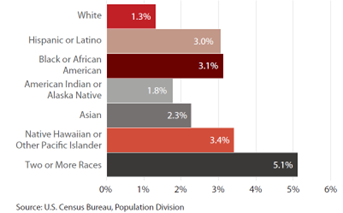Blog Post
Insight: Age, Sex, Race, and Ethnicity estimates release from the Census Bureau
By Mallory Bateman
At the end of June, the Census Bureau released the last piece of their population estimate suite for the 2021 vintage. The age, sex, race, and ethnicity estimates are available at the national, state, and county levels.
The latest estimates show that the trends we saw last decade have continued-
Aging – A combination of one of the biggest generational groups (Baby Boomers) aging and fertility rates decreasing has led to an increasing median age in 49 of 50 states between 2020 and 2021. Maine was the one exception, with a decrease of 0.1 years. However, that decrease did not change Maine’s position as the oldest state in the nation, with a median age of 44.7.
Utah remains the youngest state in the nation at 31.8 years, an increase of 0.5 years between 2020 and 2021. The Provo-Orem metropolitan statistical area (which includes Utah and Juab counties) was the youngest metro in the nation, with a median age of 25.7 years.
Increasing racial and ethnic diversity – Nationwide, all groups in the population experienced increases except the White population. The Native Hawaiian or Other Pacific Islander population grew the fastest, increasing by 1.54%.
In Utah, all racial and ethnic population groups grew, with Two or More races experiencing the fastest increase at 5.1% between 2020 and 2021. The non-Hispanic White population added the most residents (33,316), and the Hispanic or Latino population added the second most (14,531).
Figure 1: Utah Annual Percent Growth by Race and Ethnicity

New approaches to estimates – For those wondering how the Census Bureau produced these estimates without the detailed data from the 2020 census (to be released in 2023), the Census Bureau has provided a methodology statement explaining their approach.
For more Utah-focused insights on this release, visit our Fact Sheets on Race and Ethnicity and Age.
Mallory Bateman is the director of demographic research and state data center coordinator at the Kem C. Gardner Policy Institute.
Note: The opinions expressed are those of the author alone and do not reflect an institutional position of the Gardner Institute. We hope the opinions shared contribute to the marketplace of ideas and help people as they formulate their own INFORMED DECISIONS™.

